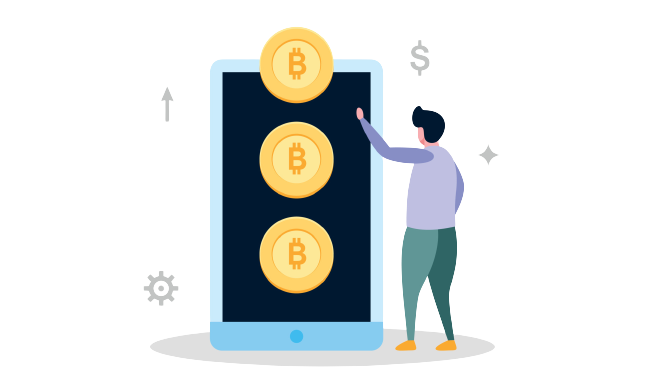
Imagine your Bitcoin wallet as a special digital vault that holds your valuable Bitcoins. Just like you would want to keep your money safe in a physical vault, you need to do the same for your digital Bitcoins.
Taking a backup of your Bitcoin wallet is like making a copy of a key to your vault. This backup is a file that holds important information about your wallet, such as secret codes called private keys. These private keys are like special keys that can unlock your vault and let you access your Bitcoins.
The reason backup files are so important is because computers and devices can sometimes have problems. They could crash, get lost, or get stolen. If you didn’t have a backup of your wallet, and something happened to your device, you might lose access to your Bitcoins forever. It’s like losing the only key to your vault!
But when you have a backup, it’s like having a spare key to your vault. If anything goes wrong with your main key (your original wallet), you can use the backup to unlock your vault and get to your Bitcoins. This way, even if your computer has a problem or gets lost, you can still get back your valuable Bitcoins using the backup.
Taking a backup of your Bitcoin wallet is like making sure you have a copy of your special key so that you don’t lose access to your digital money if something unexpected happens to your device. It’s a smart and safe thing to do to keep your Bitcoins protected.
Emphasis on safeguarding digital assets through proper backup procedures
Safeguarding your digital assets through proper backup procedures is a crucial step to ensure the security and protection of your valuable information. Here’s how you can put a strong emphasis on this important practice:
Highlight the Risks: Begin by explaining the potential risks involved in not having proper backups. Talk about scenarios where data loss could occur due to device failures, accidents, or cyber threats. This sets the stage for understanding why backup procedures are so vital.
Real-life Examples: Share real-life stories or examples of people who faced data loss because they didn’t have backups. These relatable stories can help drive home the point about the negative consequences of not safeguarding digital assets.
Use Clear Language: Explain the backup process using simple, clear language that anyone can understand. Avoid technical jargon that might confuse people. Break down complex terms into relatable concepts.
Visual Aids: Incorporate visuals like infographics or diagrams that illustrate the backup process step by step. Visual aids can make the procedure easier to comprehend, especially for those who are new to the concept.
Comparisons: Draw parallels between safeguarding physical valuables and digital assets. Just as people lock their doors and put valuable items in a safe, emphasize that creating backups is a digital version of this protection.
Consequences of Loss: Describe the potential consequences of losing access to digital assets. This could include losing important documents, cherished memories, or, in the case of cryptocurrencies like Bitcoin, losing actual monetary value.
Recovery Stories: Share success stories of individuals who were able to recover their data and digital assets because they had proper backups. This demonstrates the positive outcomes of following backup procedures.
Step-by-Step Guide: Provide a user-friendly, step-by-step guide on how to create backups for various types of digital assets, whether it’s personal documents or cryptocurrency wallets. Include screenshots or images to make it even more practical.
Regular Reminders: Stress the importance of regular backups by setting up reminders. Just like changing the batteries in a smoke detector, emphasize that backups should be a routine practice.
Future Proofing: Explain how having backups is not only for the present but also the future. As technology evolves, having backups ensures that you can access your digital assets even when using different devices or platforms.
Tailored Recommendations: Provide tailored recommendations based on the specific type of digital assets your audience deals with. Whether it’s photos, important files, or cryptocurrencies, offer relevant advice for each scenario.
Security Emphasis: Discuss how backups contribute to overall digital security. Explain that having multiple copies of data, securely stored in different locations, reduces the risk of permanent loss.

By combining these approaches, you can effectively emphasize the critical importance of safeguarding digital assets through proper backup procedures. It’s about making the topic relatable, understandable, and actionable for everyone, regardless of their level of technical expertise.
Understanding Bitcoin Wallet Backup
Explanation of What a Bitcoin Wallet Backup File Is
A Bitcoin wallet backup file is like a digital safety net that protects your valuable Bitcoins and the important information associated with them. Think of it as a snapshot of your digital wallet’s current state. This file contains crucial details like your private keys and transaction history.
Just like you’d want to keep a copy of your important documents in case something happens to the originals, having a Bitcoin wallet backup is like having a duplicate key to your digital treasure chest.
Importance of Backup Files for Disaster Recovery and Security
See your Bitcoin wallet as a virtual vault containing your precious digital coins. Now, consider the various virtual dangers that could affect this vault, like a digital storm. Maybe your device crashes gets stolen, or you accidentally delete your wallet. This is where the backup file comes to the rescue.
Disaster Recovery: If something unfortunate happens to your wallet or the device it’s on, having a backup lets you recreate your wallet and retrieve your Bitcoins. It’s like having a spare key to open your vault if you lose the original one.
Security: Creating backups isn’t just about accidents; it’s also about security. Your private keys are like the secret codes to your vault, and having them backed up means you’re prepared even if your device fails or gets compromised.
Having a backup ensures your Bitcoins are safe even if your digital world faces unforeseen challenges. By understanding what a Bitcoin wallet backup file is and why it’s important, you’re taking a big step toward securing your digital assets and being prepared for whatever the virtual world throws your way
Selecting A Bitcoin Wallet Backup Method
Below are some Factors to Consider When Choosing a Backup Method
When it comes to choosing a backup method for your Bitcoin wallet, you’ll want to consider a few important factors that can make a big difference in how well your digital assets are protected.
Wallet Type: Different types of Bitcoin wallets (software, hardware, mobile, etc.) have unique features and characteristics. The backup method that suits one type might not be the best for another. For instance, some wallets might use a seed phrase, while others rely on exporting private keys.
Security Level: Security is paramount. Your backup method should be highly secure to prevent unauthorized access to your private keys or seed phrase. Look for methods that use encryption and are resistant to hacking attempts.
Convenience: While security is crucial, your backup method should also be convenient enough that you’ll use it. If it’s too complex or time-consuming, you might procrastinate or skip it altogether.
Insight: Just like choosing the right lock for your door involves considering factors like strength, ease of use, and security, selecting a backup method for your Bitcoin wallet involves thinking about different aspects to ensure a well-rounded choice.
Creating a Bitcoin Wallet Backup
Step-by-step guide for creating a backup file
Safeguarding your Bitcoin wallet involves creating a backup file to protect your valuable assets. Depending on the type of wallet you have, the backup process might differ:
Software Wallets: If you have a software wallet, you can usually export your private keys or generate a mnemonic seed phrase. These are secret words that act like a key to your wallet. Write them down on paper and keep them in a secure place. This backup allows you to recover your wallet if needed.
Hardware Wallets: Hardware wallets often provide an option to generate a seed phrase during setup. Write this phrase down on paper and keep it offline in a safe spot. In case your hardware wallet is lost or damaged, you can use the seed phrase to recover your wallet.
Paper Wallets: For paper wallets, you’ll need to copy both the public address (where you receive Bitcoins) and the private key (to spend them) onto physical media, such as paper or metal. Make multiple copies and store them in secure locations.
Mobile Wallets: Mobile wallets might offer the ability to export your seed phrase or private keys. Similar to other wallets, save these in a safe, offline location to ensure recovery if your device is lost.

Web Wallets: If you use a web wallet, follow the platform’s specific backup procedures. This might involve exporting keys or other instructions provided by the service. Make sure to securely store the information according to their recommendations.
Emphasis On Following The Wallet Provider’s Official Instructions
While creating a backup is crucial, it’s equally important to follow the official instructions provided by your wallet provider. Wallets have different security measures and specific ways to handle backups. Adhering to their guidelines ensures that your backup is accurate and reliable.
The backup is your insurance against unexpected events. By carefully following the steps and guidelines specific to your wallet type, you’ll be well-prepared to protect your Bitcoins and ensure you can access them when you need to. It’s like having a well-prepared emergency plan for your valuable digital treasures.
Conclusion
The security of your Bitcoin wallet through proper backup procedures is not just a recommendation but a fundamental necessity. The process of taking a Bitcoin wallet backup file is equivalent to locking your virtual vault with an extra layer of security. By creating a backup, you’re not only protecting your valuable assets from unforeseen digital mishaps but also empowering yourself with the ability to recover in the face of adversity. Remember, just as responsible individuals take precautions to secure their physical valuables, taking the time to understand and implement a robust backup strategy ensures the safety and accessibility of your digital wealth. So, whether you’re dealing with cryptocurrencies or other digital assets, taking that backup step is like fortifying the walls of your digital fortress, providing you with peace of mind and readiness for whatever the digital future holds.